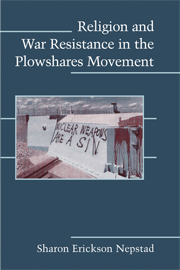Book contents
- Frontmatter
- Contents
- List of Tables and Figures
- Preface
- Acknowledgments
- Religion and War Resistance in the Plowshares Movement
- INTRODUCTION: MOVEMENT CHALLENGES AND TRAJECTORIES
- Part I The U.S. Plowshares Movement
- 1 HISTORICAL DEVELOPMENT OF THE U.S. PLOWSHARES MOVEMENT
- 2 TACTICAL LEGITIMATION AND THE THEOLOGY OF RESISTANCE
- 3 SUSTAINING COMMITMENT
- 4 DEATH OF A CHARISMATIC LEADER
- Part II The International Plowshares Movements
- 8 CONCLUSION: FROM FAILED ATTEMPTS TO PERSISTENT RESISTANCE – UNDERSTANDING DIVERGENT MOVEMENT TRAJECTORIES
- Appendix A Survey Questionnaire
- Appendix B List of Interviews by Author
- Appendix C Chronological List of Plowshares Actions by Region
- Bibliography
- Index
4 - DEATH OF A CHARISMATIC LEADER
Published online by Cambridge University Press: 05 September 2012
- Frontmatter
- Contents
- List of Tables and Figures
- Preface
- Acknowledgments
- Religion and War Resistance in the Plowshares Movement
- INTRODUCTION: MOVEMENT CHALLENGES AND TRAJECTORIES
- Part I The U.S. Plowshares Movement
- 1 HISTORICAL DEVELOPMENT OF THE U.S. PLOWSHARES MOVEMENT
- 2 TACTICAL LEGITIMATION AND THE THEOLOGY OF RESISTANCE
- 3 SUSTAINING COMMITMENT
- 4 DEATH OF A CHARISMATIC LEADER
- Part II The International Plowshares Movements
- 8 CONCLUSION: FROM FAILED ATTEMPTS TO PERSISTENT RESISTANCE – UNDERSTANDING DIVERGENT MOVEMENT TRAJECTORIES
- Appendix A Survey Questionnaire
- Appendix B List of Interviews by Author
- Appendix C Chronological List of Plowshares Actions by Region
- Bibliography
- Index
Summary
There are many highly committed individuals in the Plowshares movement who have tenaciously resisted war, year after year, regardless of the consequences. But no one embodied this spirit of persistent resistance more than Philip Berrigan. For nearly four decades, he challenged military policies and called the church to reject war. Despite serving eleven years in prison, he did not stop engaging in prophetic provocation. Even when he was diagnosed with cancer, he continued denouncing weapons of mass destruction. Days before he died, he dictated a final statement to his wife. He said, “I die with the conviction, held since 1968 and Catonsville, that nuclear weapons are the scourge of the earth. To mine for them, manufacture them, deploy them, use them, is a curse against God, the human family, and the earth itself.” When he passed away at Jonah House on December 6, 2002, he left a legacy of radical religious peacemaking.
Philip Berrigan will undoubtedly be remembered as one of the most committed and controversial war resisters of his era. But his outspoken opposition to militarism did not begin until his midlife years. As a young man, he willingly went off to fight in World War II. In his autobiography, he wrote:
I longed to join my older brothers at the battlefront. I wanted to join the hunt for Adolf Hitler, to hack him into pieces, and to count the demons as they flew out of his wounds. I wanted to charge pillboxes, blow up machines gun nests, and fight hand-to-hand with my country's enemies.[…]
- Type
- Chapter
- Information
- Religion and War Resistance in the Plowshares Movement , pp. 116 - 128Publisher: Cambridge University PressPrint publication year: 2008



